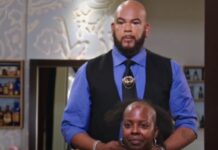*Former drug trafficker “Freeway” Rick Ross is sharing his expertise to help Black and brown people get into the cannabis business in Los Angeles, Chicago, and Detroit.
Cannabis will be legalized in Illinois as of Jan. 1, 2020, allowing those over 21 years of age to purchase cannabis products at licensed dispensaries
In an interview with The Chicago Reporter, Ross touches on social equity and what Black entrepreneurs in Chicago can learn from that cannabis industry in California.
Below are excerpts from the conversation, and check out the clip above of Ross talking about going from selling illegal drugs to entering the legal marijuana business.
OTHER NEWS YOU MIGHT HAVE MISSED: WATCH Patti LaBelle and Anthony Anderson Kill the ‘Good Times’ Theme Song

What has the legalization process looked like for black and brown people in California so far?
(Laughing) None. I think on the first round of licensing maybe two people got licensed for the pre ICOs (interim control ordinance). We were able to get a social equity program in LA, but I don’t think it really looks like social equity the way it’s supposed to be. They know that blacks were arrested eight times more than whites and like four times more than Latinos. But when social equity came out, it didn’t favor blacks.
I think our social equity program right now in Los Angeles is favoring Armenians, then Mexicans, then whites, then blacks. That’s not social equity. A black person should have been the first one to win a license in this poll. But the way LA set their whole thing up, I thought was anti-black and anti-poor because they had it set up where you have to have high speed internet, special computers, like the Ferrari of computers. Most of the people in my neighborhood don’t even have computers and don’t have internet. So that would already put them at a disadvantage. I thought that it should have been a situation where since blacks have been affected eight times to one, that decision will be set up where these eight times would have an advantage, if it’s social equity. I don’t think that it turned out to really be social equity at all.
Have there been any success stories through social equity programs?
I’m a success story in social equity. I won my license two days ago. I’m happy for myself, but I’m also sad for so many other people that were coming to the rallies that were working so hard to get an opportunity to have a license.
One of the guys I know, Antidote, he started working about two years ago and he was really diligent about what he did. He went to the meetings and I think he came back like 600 on the list [for licenses] and they’re only giving out 100 licenses. It’s disappointing when you see that. Then you see so many other people who are not social equity applicants, people who are staying in $5 million houses, but because they know how to manipulate the system they make themselves look like social equity applicants. Most rich people have learned to live off of corporations. They don’t make any money, on paper, kind of like what Donald Trump does. Donald Trump hasn’t paid taxes, I think in 15 years or something they said. They understand how to make themselves look good on paper, where they don’t have to pay taxes. But they live like kings driving Ferraris and Bentleys and, staying at Mar-a-lago or whatever it’s called. But on paper, if you take them to the tax people, the tax people say he’s broke. You would qualify for social equity, even though you’re living like a king, and I don’t think that that’s what social equity was meant for.
We have people out here who are actually broke, who are actually hungry and those are the people that I feel should be benefiting from the social equity program. And those are the people my license are going to be helping.
What can residents of Illinois, who are going to try to jump into this game and apply for some of these social equity aspects, expect? What kind of pitfalls should they look out for?
There are going to be guys that come here that are going to look like they’re here to help, but they’re really here to rob and steal from the ignorant, from the people who don’t really know what they’re getting into. When they look up in a couple years, they’ll be offering them $100,000, which is going to look like a lot of money to some people, but it’s not really what social equity, in my opinion, was meant for. I believe that social equity is: if they create and make you a millionaire, then you’re supposed to take that money back into your community, and use that wealth to benefit everybody. But we have people who are now chasing social equity applicants, who already worth $100 million, and they do absolutely nothing for the community. And I don’t think that that’s going to change because, they sow up the social equity applications and the licenses around the country. It’s just going to be fat cats getting fatter, instead of the community benefiting from social equity, which is what it should be.
Do you have a reaction to the lack of black ownership in the Illinois cannabis business so far?
I was really disappointed when I came last time and I found out the way that Illinois had did the licensing process. I thought it was totally anti-Chicago to allow outside entities to come in first and get set up. From my dealing in drugs, I’ve found that humans are creatures of habit. If we start to go to a particular place, we tend to go there until something stops us from going there. What I mean by that is if you have a dispensary and your customers are coming in, and you keep treating your customers the same way, you don’t treat them no worse and no better. You don’t have to because they’re satisfied. And they’re going to keep coming to you. Now, when I open up my dispensary, why would they change from him and come to me, unless I was able to give some type of an advantage. So when you allow people to come in and get the licenses first, you give them an advantage over the people who’s going to come after them.
Thirty years ago you were able to create a national illicit network that provided livelihoods for hundreds of black people at least. Are you are you going to be able to do that same process with legalization?
How did you know? I already got a plan. I feel like I have a plan that even if the system doesn’t work in our favor, with the one license that I have, we’ll be able to help a lot of black people. We get a delivery service and with the delivery services you can deliver all over the state of California.
We’re getting together to build an app for black people and everybody’s going to know it’s for black people. I don’t care if they know. They might say that I’m a racist because I’m doing it, but I felt that they’re going to be a lot of black guys like Antidote. Even my brother, he applied and he didn’t even get vetted until after the process was all over. Then they vetted him and told him ‘oh you’re eligible’ when it was too late for him to get in. [With my plan], all those people can still participate in the business without actually winning a license.
How expansive is your business plan? Are you opening cultivation centers or just dispensaries?
Right now, I was granted a dispensary license. It also means that I get to deliver as well. I’ll start off with that. I don’t know if you know the whole story about the drug business, but I started off in the cocaine business with $125. I feel that if I can take that and build up, then I can take this and also build it up as well.
We Publish News 24/7. Don’t Miss A Story. Click HERE to SUBSCRIBE to Our Newsletter Now!





